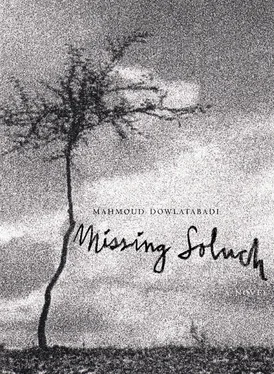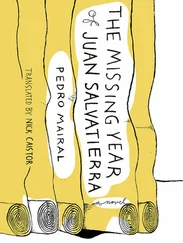Uncle Aman wasn’t far from the truth. The girls in the hilltop villages weren’t modest at all. They didn’t even wear chadors . They were quick to laugh. They’d gather in groups and come to buy things. They’d gather around the display and beguile Abbas with their natural and pleasant laughter. Abbas would lose his bearings and the girls would pocket pins, hair clasps, and bangles, trading them for a flirtatious wink.
One time, Uncle Aman and Abbas had begun to argue, in the middle of nowhere. The uncle’s blood began to boil, and he threw Abbas onto the parched cracked earth, and said, “I’m going to search you all over, even in your nostrils! You’ve wasted just the few coins I have. You’re bankrupting me, you thief! What the hell am I supposed to do with you?”
Then he stripped Abbas bare. Naked. He looked in every fold of Abbas’ clothes until, out of the hem of his pants, he managed to find a two- toman note. Still naked, with his clothes in his arms, he ran alongside his uncle, pleading, “I swear to God, on the blood of Imam Hussein, these two tomans are my own. I won it gambling!”
But his uncle didn’t believe him. He simply set new rules for Abbas to obey.
“If you even think of doing this again, I’ll tie up your hands and feet and toss you right here on the cracked earth so that vultures can have a go at your eyes!”
After that, Abbas kept his mouth shut and quietly followed behind Uncle Aman and his donkey. Later, while he was working on plastering a bread oven, Soluch, who had never gotten along well with Uncle Aman, said, “So are you satisfied now? Did you learn a trade from your uncle? If you’ve hit your head on a stone, come and take on the work of your ancestors and buy bread with an honest wage!”
Abbas had never gone back, and he didn’t feel a moment’s regret. Now that he thought about it, he realized that the girls in hilltop villages were beautiful and pleasant. “They were like milk-drunk lambs nudging for more!”
Mergan arrived, carrying with one hand the tin of embers, and with the other, holding Hajer’s hand. Abbas could make out their outlines in the night. Hajer had just begun to cry again. Not loudly, her sobs were stifled. Her mother was pulling her behind her; Hajer was dragging her feet. Some sort of terror, a terror of her older brother, made her knees tremble. Although she had found her mother’s protection, she was still uneasy. She dragged her feet and looked anxious. This only stoked Mergan’s anger, and even before reaching the house, she was swearing a storm over Abbas and addressing him with whatever insult came to mind as she walked.
“So where is he, the son of a bastard? In what hell is he hiding? So he thinks he’s a young lion, eh? I’ll show him! As soon as the arena’s empty, he attacks, does he …? So where is that brother of yours?”
Abrau emerged from under the blanket.
“I don’t know. He’s the one who attacked me and chewed my ear this morning.”
This lit a fire beneath Mergan’s feet. It compelled her to increase the volume of her swearing. Abbas was becoming a challenge in Mergan’s closed life. She couldn’t let him go any further in his impudence — she’d have to take care of him very soon. In this house, there was only room for one lord, either Mergan or Abbas. She had to make clear who held the reins in the household. She couldn’t let her son become a threat, even a hollow one. The boy had become a lion for himself. Now he was threatening Mergan’s children.
Mergan placed the tin next to the stove. She went to the pantry and returned with fire tongs. She went to the stables, searched the nooks and crannies, came out, and shouted, “Where have you hid yourself, lion heart? If you’re such a man, why not show yourself to me?”
Abbas scrambled and climbed up to the yard wall around the house, but Mergan made out his dark outline as he did so. Mergan ran, but before she could reach him, Abbas was on the wall and shuffling away. Mergan went to the foot of the wall and said angrily, “You! If you so much as touch one of my children again, I’ll ruin you! Take these words and hang them on your ears!”
Abbas didn’t reply and leapt to the neighboring roof. Up there, the cold air had more of a bite, but just that he was out of Mergan’s reach was enough for him. Mergan grabbed the blanket he had left by the bread oven and began walking back to the room.
“Tonight you can wander the streets and rooftops like a stray dog — that should teach you a lesson!”
Mergan entered the room and closed the door behind her, sliding the heavy lock into place. Hajer was still trembling. Mergan set the blanket on her daughter’s lean shoulders and, using the tongs, stirred the embers in the tin beside the stove. Then she tossed the tongs to one side and busied herself with setting out the places for sleep. The beds needed to be set around the tin of embers, as they were every night. Mergan set a heater cover over the tin and placed a blanket over the contraption. She laid out Hajer in the place she had been sitting and covered her entire body, as much as was possible. Then she pulled on Abrau’s feet and positioned him close to the heater as well. Then she blew out the lamp and lay down in her own place.
Beneath the arched ceiling of the room, the night was pitch black. Since during the winters they covered the opening in the roof, there were neither doors nor windows to allow the eye to pass through the darkness to catch a glimpse of the open and starry night.
Under the weight of the night, Mergan was trembling. Her feet, her hands, and her heart, all trembling. She could not calm herself. She ran her fingers through the smooth hair of her daughter and cooed, “Did he hit you hard?”
Hajer answered, “I didn’t say. I didn’t tell him anything!”
Mergan pressed the girl’s face to her chest and felt something like smoke escaping from her heart and passing through her entire body, eventually escaping through her eyes and throat. Her lips and eyelids began to shake, but Mergan held back the clamorous wave. She didn’t want to worry her daughter by sobbing. She herself hated mourning ceremonies. So she let Hajer go and she rose, took a handful of wheat grain from the pantry, and put half of it into her daughter’s hand.
“Tomorrow we’ll get flour. We’ll light the bread oven.”
She was left to calm herself. But peace of mind escaped from her. Her heart beat. Her thoughts went in a thousand directions. More than anything, Abbas was the object of her irritation. It was cold outside, the dry cold of the desert. A wolf could hardly survive in this climate. So what could that baby grasshopper do? There was no sign from him! Mergan was waiting for Abbas to let out a cry. To scream. To swear and throw himself against the door. But Abbas had not done this. What would he do? Why was there no sign of him? Mergan wanted to get up and go out, grab his wrist, and bring him home. But something unclear prevented her from doing this. Perhaps because she didn’t want to go against herself? She didn’t want what she had said to be worthless. She didn’t want her threats to seem without substance. She was stuck. She had trapped herself. Pangs shot through her heart. She didn’t want to torment her son, but she did. She couldn’t bear the pain of this, but she did. This itself was the worst. That she was able to bear something that her heart did not want to bear. So she was hurting herself twice. Once, from her son’s pain; second, from the pain of bearing this pain. She didn’t know what she could do. If she called out and told him to come home, Abbas would never again pay mind to her instructions or threats, and would never take her seriously again. But this way, she would have to stay up worried about him until the dawn, grinding her teeth and feeling vinegar boil inside her. If she sent Hajer out to him, she knew he was clever enough to see that this would be a ruse arranged by their mother. Then the only outcome would be a fruitless mendacity. So Mergan was confused. Her heart was on fire, and she couldn’t lie still. She kept moving her weight from shoulder to shoulder, and she chewed on the blanket and pillow.
Читать дальше












